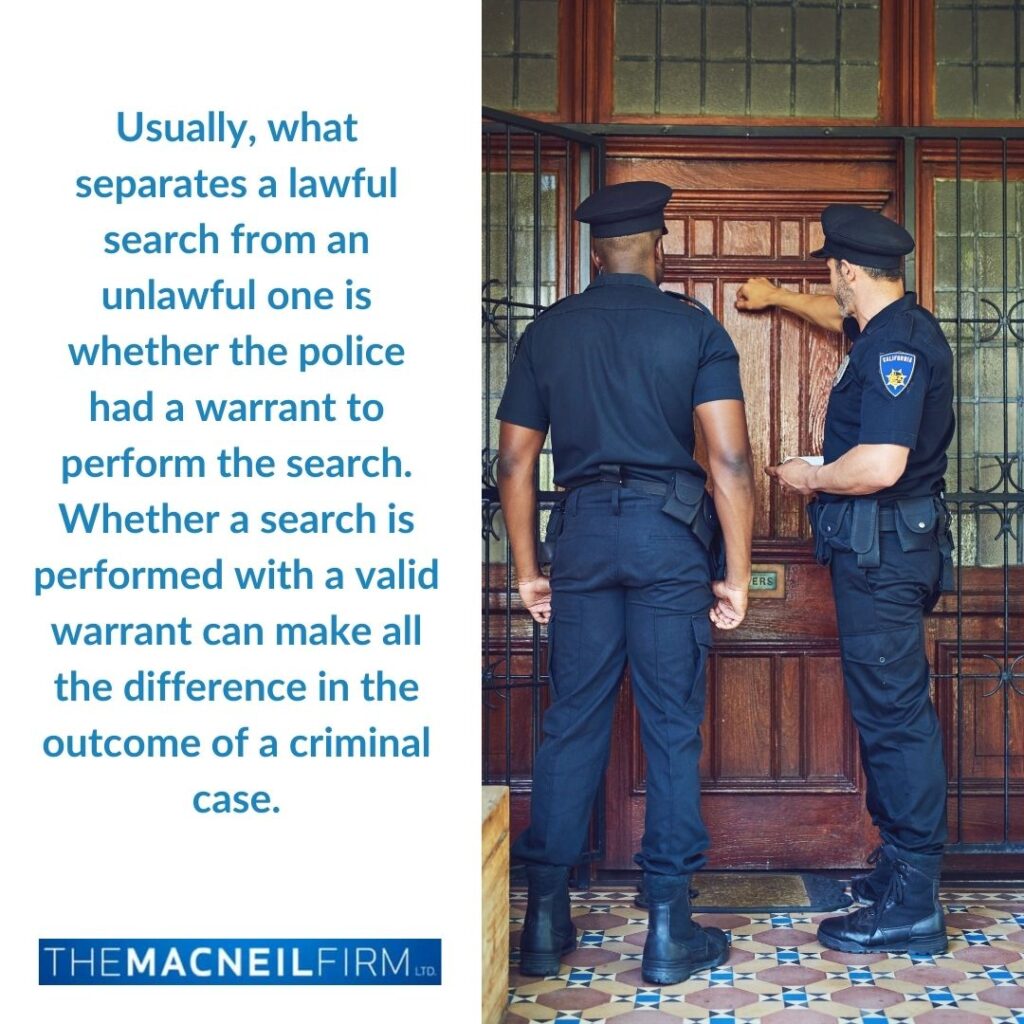Generally speaking, the police cannot extend a search beyond the items stated in a warrant. However, there have been cases in which police discover other evidence of criminal activity while conducting a valid and legal search. If you’ve been charged because of something police found while executing a warrant, you need a criminal defense lawyer to evaluate your case. We will do a thorough investigation and help you determine the best path forward for your case. Call The MacNeil Firm today at 708-218-0947.
If the evidence is found in a place that the warrant allowed them to be, then the finding may serve as probable cause to extend or expand the search beyond what is indicated in the warrant. However, if the evidence was found in a place where the police were clearly not allowed, then the evidence may be suppressed.
If a weapon is in plain view of an officer, they are allowed to seize it or make an arrest without a warrant. Searches can also be conducted without a warrant if there is probable cause, which is generally defined as an articulable and reasonable suspicion of criminal wrongdoing. However, this definition is subject to much interpretation. Because of the variance in the interpretation of the definition of probable cause, warrantless searches are often subject to attack through a motion to suppress the evidence.
At a hearing on a motion to suppress evidence, the judge considers the evidence and makes a determination as to whether or not the search was legal. If the court determines that a search was illegally conducted, the evidence that was obtained from that search would be suppressed, meaning that the state’s attorney would be unable to use it as evidence at trial. Oftentimes this forces the prosecutor to dismiss the case.
Protective Sweeps Of a Residence
The term ‘protective sweep’ refers to the gathering and monitoring of occupants in a household during the search of a residence in order to preserve evidence and ensure the safety of the officers. A protective sweep is a formality that occurs prior to the police making the search of a residence.
A typical protective sweep scenario involves officers having an arrest warrant for someone and needing to enter a home to make the arrest. Protective sweeps can also involve arrests near homes and arrests in other kinds of buildings. To guard against unexpected attack from unseen people in the home, the police are typically allowed to perform at least some kind of limited search of other parts of the premises.
These sweeps are limited by place and time. Officers may only look in a place where a person could be hiding. They generally must be quick and last only as long as it takes to dispel the risk of danger. A criminal defense lawyer can look at the details of your case and determine if the protective sweep conducted was lawful.
Stopping and Searching Someone Suspected of Possession Of Weapons or Guns
Stop and frisk searches are essentially random, warrantless searches that are conducted with minimal probable cause. Nonetheless, they are legal under certain circumstances. If an officer has reasonable and articulable suspicion that a person is armed and dangerous, they are allowed to conduct this type of search in order to identify potentially dangerous weapons and ensure their own safety.
This means that searching for other types of contraband during a stop and frisk search is disallowed. Although the search is meant to protect the officer’s safety, many officers use it as a way to collect or search for evidence of a crime. Ultimately, the determination of whether or not a stop and frisk search was conducted under the appropriate circumstances is dictated by the court’s interpretation of the officer’s suspicion and reasoning for the initial stop. If you believe you were illegally searched, contact our criminal defense lawyer today.
How a Criminal Defense Lawyer May Defend Against a Search and Seizure
When defending against a search and seizure case, the attorney will look very closely for an opportunity to challenge the legitimacy of the search. If the court determines that the search and seizure was illegal, then the case will frequently be dismissed. Personally, we begin by examining the police reports and any transcripts of police testimony for inconsistencies as well as defects in their version of the facts. Catching the police in a lie by using their own evidence creates for a strong defense. We are particularly successful in these types of situations because of the emphasis we place on attention to detail.
For more information on the scope of search warrants, a free initial consultation is your next best step. Get the information and legal answers you are seeking by calling our criminal defense lawyer at 708-218-0947 today.



